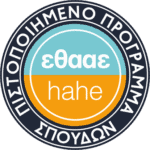Address by the Department Chair
- Αρχική
- >
- Department
- >
- Address by the Department...

Golfo Maggini
(PhD, University of Paris XII)
Department Chair
Professor of Modern and Contemporary Philosophy
Important files & links
Dear students,
I would like to congratulate you and welcome you to the Philosophy Department of the University of Ioannina [henceforth: the Department], one of the three strictly philosophy departments in Greece. The Department constitutes the evolution and transformation of the Department of Philosophy, Education and Psychology, that was originally founded in 1984 and later divided in the two separate Departments of Philosophy and of Psychology in August 2018. The mission of the Department consists in the study and research of all the areas of philosophy, both in systematic and historical perspective. Additionally, the Department offers to all its students a solid and broad education in the field of Education Studies, thus providing them a qualified teacher status in secondary education and in a series of other fields of expertise after the completion of their studies.
The primary goal of the Department consists in the transmission of the necessary skills, knowledge and methodology to the students in order to enable them to engage critically and successfully with the wide range of particular, yet intertwined, philosophical disciplines so that, and in combination with the educational studies, they gain full access and awareness of the unity, the cohesion and the potential of the field. Despite the nowadays widespread crisis in the field of the humanities philosophy continues to maintain its inalienable role and value in and for the institution of the university, as the institution par excellence that enables and guarantees critical thinking and active political commitment within the scope of social sensitivity and democratic consciousness.
It’s worth mentioning that a series of internationally authoritative studies agree unanimously that Study Programs, as the one offered by the Department, contribute to the cultivation of alternative critical thinking, individual and social awareness, political involvement, scientific mobility in an international context and to the enhancement of the chances for a fulfilling professional career.
Thus, you are warmly invited to make the best and most intensive and use of the opportunities provided by the Department and the University during your studies: the academic exchange programs Erasmus+, the Authority for Employment and Career (ΔΑΣΤΑ), the Student Consulting and Supporting Center (ΣΚΕΠΙ), the amenities and services for persons with disabilities, the numerous cultural and athletic clubs and, finally, the structures and the services of the Central University Library. We also prompt you to read thoroughly the Curriculum of the Department and to navigate in the Department’s webpage in order to acquire a sufficient overview of the Department’s history, its intellectual physiognomy and of the numerous founding opportunities for research in Greece and abroad. During this process you will be closely and constantly accompanied by the core faculty mentors and all colleagues and collaborators that are academically active in the Department.
Finally, the question regarding the professional perspectives after the completion of your studies should also be addressed by the following analytic, yet by no means exhaustive, listing of eventual areas of employment and of professions: a) direct employment as teacher/instructor of secondary education in the public and private sector, given the labour rights connected to the Diploma provided by the Department, b) Schools and Centres of for Lifelong Learning and Education, c) publishing houses, libraries, archives, newspapers and journals, media, public and private cultural institutions and organizations, d) research centers and academic institutions, e) public sector and, finally, f) European institutions and non-governmental organizations (NGOs). This indicative listing of perspectives and eventual opportunities is indeed very telling for the potential for our graduate students in the job market and/or in their eventual further employment within the academia.

